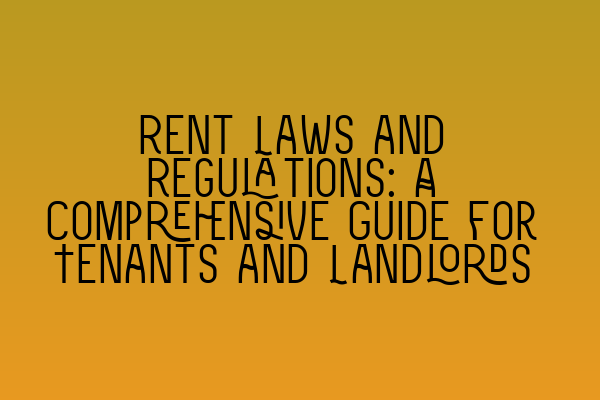Rent Laws and Regulations: A Comprehensive Guide for Tenants and Landlords
As a tenant or landlord, it is crucial to have a solid understanding of rent laws and regulations. These laws are in place to protect the rights and responsibilities of both parties involved in a rental agreement. Whether you are a tenant looking for a suitable property or a landlord renting out your property, being familiar with rent laws will ensure a smooth and fair rental experience.
In this comprehensive guide, we will delve into the various aspects of rent laws and regulations, covering everything from lease agreements to security deposits. So, let’s get started!
1. Lease Agreements:
A lease agreement is a legally binding contract between a landlord and a tenant. It outlines the terms and conditions of the rental, including rent amount, lease duration, and responsibilities of both parties. It is essential to carefully review and understand the lease agreement before signing it. If you have any concerns or questions, consult a solicitor for clarification.
2. Rent Increase:
Landlords have the right to increase rent, but they must follow certain guidelines and restrictions. Each jurisdiction may have different rules regarding rent increases, so it’s essential to familiarize yourself with the specific laws in your area. Generally, landlords should provide a notice period before implementing a rent increase.
3. Rent Control:
Rent control refers to the regulations set in place to limit the amount and frequency of rent increases. These regulations vary depending on the location. Some areas have strict rent control laws, while others have no rent control at all. It is important to know if your jurisdiction has rent control in order to understand your rights as a tenant or landlord.
4. Security Deposits:
Security deposits are a common practice in rental agreements. Landlords collect security deposits from tenants to cover any damages or unpaid rent. There are laws that govern security deposits, including the maximum amount a landlord can charge and the time frame for returning the deposit after the end of the tenancy. Tenants should document the condition of the property before moving in and familiarize themselves with the deposit refund process.
5. Evictions:
Evictions are an unfortunate aspect of renting. As a landlord, you may face situations where you need to evict a tenant due to non-payment of rent or violating the terms of the lease agreement. It is crucial to understand the legal process and follow it precisely to avoid any complications or legal consequences. Tenants must also be aware of their rights during the eviction process and seek legal advice if necessary.
6. Discrimination Laws:
Discrimination based on race, gender, religion, disability, or other protected characteristics is strictly forbidden in the rental process. Landlords cannot refuse to rent to someone based on these factors. Similarly, tenants should not be subject to discrimination during their tenancy. If you believe you have been a victim of discrimination, seek legal advice and report the incident to the appropriate authorities.
7. Maintenance and Repairs:
Landlords have a legal obligation to maintain the property in a safe and habitable condition. Essential services such as plumbing, heating, and electricity should be in proper working order. Tenants must promptly notify their landlord of any repairs needed and give them a reasonable timeframe to address the issue. If the landlord fails to make necessary repairs, tenants may have legal recourse or the ability to withhold rent.
8. Tenant’s Rights:
Tenants have numerous rights established by rent laws and regulations. These rights may include privacy, peaceful enjoyment of the property, freedom from discrimination, and the right to a fair process for eviction. It is crucial for tenants to know their rights and assert them when necessary.
9. Landlord’s Rights:
While tenants have rights, landlords also have rights protected by rent laws. These rights include the ability to collect rent, evict tenants for legitimate reasons, and protect their property from damage. Both parties should respect and abide by each other’s rights to ensure a harmonious landlord-tenant relationship.
In conclusion, understanding rent laws and regulations is essential for a successful and fair rental experience. Whether you are a tenant or a landlord, familiarize yourself with the laws in your jurisdiction and seek legal advice if needed. By knowing your rights and responsibilities, you can navigate the rental process with confidence.
For further study and preparation for your law exams, you may want to check out the following related articles:
– SQE 1 Practice Exam Questions
– SQE 1 Practice Mocks FLK1 FLK2
– SQE 2 Preparation Courses
– SQE 1 Preparation Courses
– SRA SQE Exam Dates
Educating yourself on rent laws will not only protect your rights but also contribute to a positive and mutually beneficial rental experience. Happy renting!
